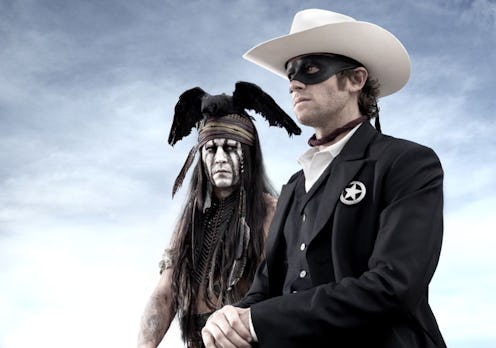Entertainment
Should You See 'The Lone Ranger'?

Pirates are out, and cowboys are in. At least, that's what the guys who brought us Pirates of the Caribbean are telling us with the release of their latest feature, The Lone Ranger. Instead of Orlando Bloom battling swashbucklers alongside Johnny Depp's Captain Jack Sparrow, we now have Armie Hammer battling the baddies of the Wild West also alongside Johnny Depp's (maybe kind of racist) version of the Indian Tonto. Directed by Gore Verbinski (Pirates of the Caribbean, Rango), The Lone Ranger marks Armie Hammer's (The Social Network) first starring role, and Johnny Depp's millionth time playing the zany sidekick. So, how does this film stack up? Let's see what the critics have to say.
On the Direction:
Gore Verbinkski directed Depp in Pirates and Rango. How did his action-packed storytelling hold up here?
"Spanning two and a half hours, director Gore Verbinskiis certainly given a lot of rope to play with, and again, a lot of money. And he makes the most of it. The picture looksgreat, with every worn piece of leather, battered piece of lumber, cloud of dust, pile of dirt and more, lensed handsomely and with care." — Kevin Jagernauth, IndieWire
"Director Gore Verbinski’s The Lone Ranger is for anyone who thought the Native American guy from the Village People and a western-wear model would make the perfect blockbuster-action team. This smart-looking but empty adventure — with a hero that looks more Tom Ford than John Ford — suffers from a shambling script, shifting tones and a surplus of villains. Clunky and drawn out, “Ranger” shoots blanks, even with the star power of Johnny Depp behind it." — New York Daily News
On Armie Hammer and Johnny Depp as the Ranger and Tonto:
Armie Hammer was the perfect actor to portray the twin Harvard students in The Social Network, but does he have enough range to pull off an action hero? Depp is rarely has a misstep when it comes to portraying unusual characters, but is his schtick getting old?
"Having proved his acting chops in “Billy: The Early Years” and “The Social Network,” Hammer offers a more uneven performance here. Alternating between silly and serious, Hammer verges on slapstick at times in his portrayal of an effete, Ivy League-educated lawyer (the only character here remotely concerned with dental hygiene) who requires Tonto’s coaching to unlock his inner heroism and exact revenge for his brother’s murder." — Peter Debruge, Variety
"Depp — the first Caucasian performer to play Tonto — will likely be brushed off and targeted for playing a Native American, though he and Verbinski get away with it by keeping the mood cartoonish. And what Depp does just with his eyes is slyly subversive, somehow cutting off criticism at the pass." — New York Daily News
"It's refreshing to see that part of Depp's comic shtick here is to deflate the solemn seriousness with which Native American traditions and mysticism are usually enveloped. Sometimes cocking his eyebrow and looking at John to see if he's buying his latest line of crap, Depp establishes a certain fundamental dignity for Tonto that's otherwise embellished by nutty detailing, the result of which is neither a truly coherent character nor one as funny as Jack Sparrow sometimes was, at least at the beginning, but most surely registers due to its idiosyncratic strangeness." — Marshall Fine, Hollywood and Fine
"The decision to cast Armie Hammer in the role of John Reid (aka The Lone Ranger) made it obvious the filmmakers were going to place Depp's Tonto front and center as Disney wasn't going to gamble a $200+ million budgeted Western on the back of an actor the audience hardly knew from his supporting roles in The Social Network and J. Edgar. So now your title character has been pushed to the supporting role and you're paying homage to a silent, 1926 comedy with Depp channeling Captain Jack Sparrow, feeding the dead crow on his head. Yeah, this should work." — Brad Brevet, Ropes of Silicon
On the Script and Story:
The story is based on the radio drama and later television series, but did the film version bring the same pizzaz to the Ranger and Tonto's tale? Or was it as dull as that millionth Pirates film?
"The script is credited to Justin Haythe (who wrote the criminally underrated “Revolutionary Road”) but also to Terry Rossio and Ted Elliott – again, the “Pirates” brain trust. It’s a mish-mash of too-hip one-liners, cowboy-and-Indian clichés and a plot that would have barely powered a half-hour episode of the beloved TV series from the 1950s. There are no surprises in it, only plot twists that announce themselves far in advance." — Marshall Fine, Hollywood and Fine
"Simply put, the actual story (once it's finally put into motion) is dreadfully dull... the boring truth revolves around land treaties and valuable real estate, and you'll figure it all out long before the characters on screen do, which is a major problem." — Kevin Jagernauth, IndieWire
"In keeping with Elliott and Rosso’s “Pirates” formula, the intervening plot proves far more complicated than such archetypal material demands, and as such is likely to alienate younger viewers who may already be overwhelmed by the intensity of Verbinski’s vision. The Lone Ranger may refuse to fire a gun unless absolutely necessary, but the film hardly shares his pacifist philosophy, its abundant carnage ranging from scary carnivorous rabbits to an ambush in which Butch kills half a dozen Texas Rangers and finishes the job by eating Dan Reid’s heart." — Peter Debruge, Variety
Image: Walt Disney Studios